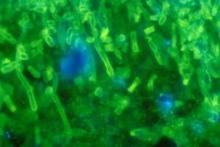SAN FRANCISCO – Every patient should get antifungal therapy following surgical treatment of intra-abdominal candidiasis, according to researchers at the University of Pittsburgh.
Not all do; 38% of 199 patients there (76) who had surgical drainage received no antifungals, at least initially; infections persisted in half (38) and 20% (15) died.
"Clinicians could not reliably identify patients who were cured with surgical drainage alone, showing that all patients require antifungal therapy in addition to drainage. A lot of people don’t get treatment, and it’s a problem," said lead investigator Dr. M. Hong Nguyen, director of both the transplant infectious diseases and the antimicrobial management programs at the university.
An overreliance on blood cultures to screen for invasive candidiasis – either before or after surgery – could be to blame; blood cultures aren’t that good at picking it up, she said at the meeting, which was sponsored by the American Society for Microbiology
Even so, they are the go-to screening option in many places because blood stream infections (candidemia) are thought to be the most common manifestations of invasive candidiasis.
That wasn’t true in Pittsburgh. Among the 199 invasive candidiasis patients Dr. Nguyen and her team investigated, intra-abdominal candidiasis (IAC) – mostly abscesses and peritonitis without candidemia – accounted for 53% (105) of cases, and candidemia just 28% (56). Intra-abdominal candidiasis "is much more of a problem than candidemia," Dr. Nguyen said.
Other cases were a blend of both, or infections at another site. Candida albicans was the most implicated organism.
Dr. Nguyen and her colleagues concluded that blood cultures aren’t the right screening tool for invasive candidiasis because they can be negative even when patients have serious disease. "We need some kind of blood diagnostic to help us," she said.
They’ve found that Candida polymerase chain reaction and Fungitell 1,3-Beta-D-glucan (BDG) blood tests seem to be better options, especially helpful when used with blood cultures (Clin. Infect. Dis. 2012;54:1240-8).
The team also concluded that "IAC is more common than recognized ... more common than candidemia, [and] associated with significant morbidity and mortality," she said.
Dr. Nguyen reported having no disclosures.



